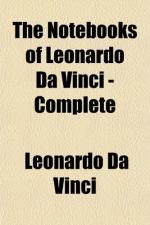|
This section contains 1,103 words (approx. 4 pages at 300 words per page) |

|
Leonardo Da Vinci: the Universal Man
Summary: A hypothesis paper that discusses the notion of whether or not Da Vinci was truly the "Universal Man."
During the Middle Ages, secular literature was lost in Europe. There were still monasteries that held classical texts, but the vast majority of Europeans were never exposed to these works. Instead, they were exposed to theological works stressing the importance of religious study and redemption. The social organization of the Middle Ages mirrored this vision of a closed and hierarchical universe. The culture of Humanism coincided with the Renaissance movement to return to the classical civilizations of ancient Greece and Rome, thereby redefining education to emphasize qualities that made an individual a true human being . The Renaissance sought to promote the principle of inquiry and experimentation and to generate an attitude of objective independence and a focus on the future. "But the Renaissance, in its full purpose, had to mean much more than a mere recovery of lost wisdom and of a lost habit of thinking. It had...
|
This section contains 1,103 words (approx. 4 pages at 300 words per page) |

|


